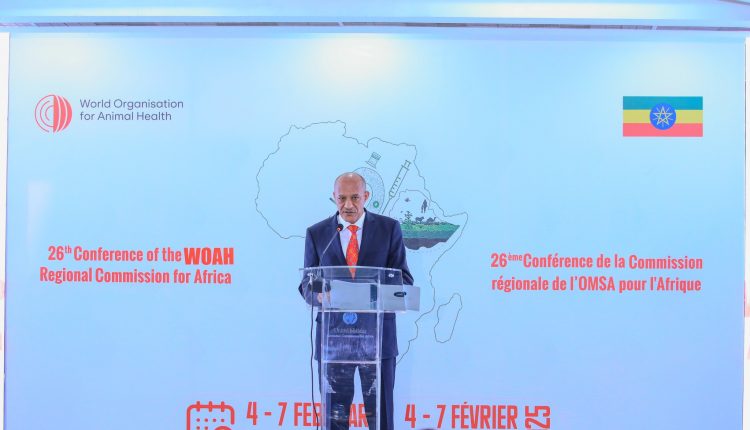Investing in innovation, commitment to progress key to build food-secure future for all – DPM
Addis Ababa, February 4, 2025 (FMC) – Investment in innovation and steadfast commitment to progress are important elements to build a healthier and more food-secure future for everyone, according to Ethiopia’s Deputy Prime Minister Mr. Temesgen Truneh.
Deputy PM Temesgen made this statement after launching the 26th Conference of the World Organisation for Animal Health (WOAH) Regional Commission for Africa this morning.
The 6th Conference of the WOAH Regional Commission for Africa (RC26) is being held in Addis Ababa from 4th to 7th February under the theme “Animal health for food security and public health in Africa”. Ministers, diplomats, representatives from member states of the African Union, mainly Chief Veterinary Officers and WOAH permanent delegates, are taking part at the event.

Following the opening of the Conference, Temesgen took it to social media and emphasized the significance of concerted efforts on issues pertaining to animal health and ensuring food security.
“Understanding that animal health is directly tied to food production and the well-being of our people, we must take a collaborative approach to address this challenge,” he noted.
According to Temsgen, the 6th Conference of the WOAH Regional Commission for Africa is more than just a gathering—it is a commitment to strengthening partnerships and reinforcing the essential role that veterinary service play in securing food systems and public health.
“Through the Bounty of the Basket Initiative, we have made significant strides—enhancing the production of nutrient-dense food, preventing poaching, and protecting animal health. By improving the supply and quality of animal feed, we are not only safeguarding livestock but also ensuring that communities across Africa have access to safer and more nutritious food,” he said.
The Deputy PM asserted, “We have also taken concrete steps to combat cross-border animal diseases. From establishing the National Institute of Animal Health to implementing robust disease prevention measures, we recognize that these threats do not respect borders—and neither should our solutions.”
But we cannot stop here, he said, pointing out that this work must continue.
Conferences like this are essential in shaping policies, strengthening veterinary services, and enforcing health standards in the trade of animals and animal products, Temesgen underscored.
“When we work together, when we invest in innovation, and when we remain committed to progress, we build a healthier, more food-secure future for all. Let’s move forward, not just with ideas, but with action,” he added.

